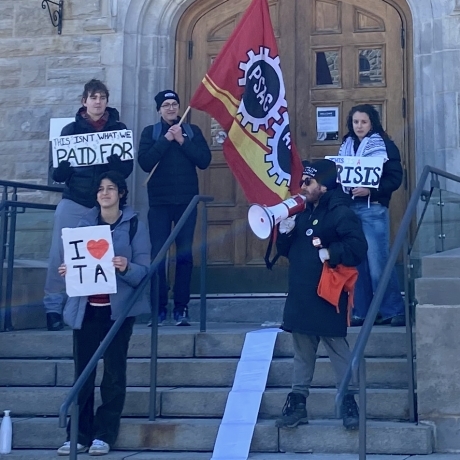News
You are here
“We make the university run — and we can shut it down”

March 29, 2025
At Queen’s University, over 2,000 graduate student workers—teaching assistants, research assistants, and teaching fellows represented by PSAC 901—have been on strike since March 10. They are the largest academic labour force on campus, the most precarious, and now the ones who have brought university operations to a halt.
As the winter term ends, hundreds of classes remain incomplete without teaching assistants and teaching fellows. Instead of returning to the bargaining table with a fair proposal, the administration has scrambled to reweight assessments and assign “Credit Received (CR)” marks—shortcuts that sidestep accountability to both undergraduates and striking grad workers. The PSAC 901 strike exposes deep contradictions in the university’s priorities: when its most vulnerable workers demand justice, the administration chooses crisis management over fair compensation.
What’s happening at Queen’s is not unique. From public universities to colleges, the Canadian higher education system is in crisis—one whose burdens fall on graduate workers, non-tenure-track scholars, and international student workers.
Class warfare in the classroom
Graduate workers make the university run. They lead tutorials, grade papers, mentor undergrads, manage labs, and support research. In return, they are paid poverty wages. Queen’s offers PhD students a “minimum funding package” of $23,000 per year—before tuition is deducted. Domestic PhD tuition is over $7,300; international students pay more than $8,000. Rent in Kingston keeps rising—and Queen’s is part of the problem, hiking community housing rent by 30% over three years starting in 2024.
That $23,000 “guarantee” only lasts four years, while most PhD programs take six. Students must keep paying fees to stay enrolled—just to teach and finish their degrees. After coursework ends, the financial support vanishes, but the tuition bills remain. In effect, graduate workers pay to teach. After rent and tuition, there’s little left.
And yet the university insists it can’t afford more. “Budget crisis.” “Structural deficit.” These are the buzzwords rolled out while top administrators make hundreds of thousands. In 2025, Principal Patrick Deane took home over $419,000. Provost Matthew Evans, who spearheaded austerity measures, earned $375,000. The message is clear: austerity for workers, abundance for management.
Manufacturing crisis, undermining solidarity
The university hasn’t just rejected PSAC 901’s demands—it has tried to break the strike. Departments have circulated vague warnings about graduation delays. Some have misrepresented the legality of the strike to sow confusion and fear.
But the strike is holding—and it has gained unprecedented undergraduate support. Within three days of its release, a petition backing PSAC 901 drew nearly 1,700 undergraduate signatures. They understand what the university doesn’t: when grad workers are underpaid, undergrads are under-taught. At the March 27 rally, hundreds of students chanted, “A fair contract for fair grades.”
This solidarity reveals where the real power lies. Every university report on the budget “crisis” blames Doug Ford’s 2019 undergraduate tuition freeze. The implication is that undergrads are the problem—tuition reductions are framed as the root of financial strain. But undergrads deserve free education. Graduate workers deserve tuition-free enrollment and well-funded employment. The PSAC 901 strike’s first victory is ideological: it challenges the dominant narrative of austerity.
Queen’s as landlord, boss, and investor
Queen’s isn’t just a university. It’s one of Kingston’s largest landlords and employers. It shapes the city’s housing and labour markets—while pleading poverty to its own workers.
This contradiction is structural. Federal and provincial governments have defunded higher education for decades. Universities now depend on tuition—especially from international students—commodifying education and exploiting labour. Public institutions behave like private corporations. Senior administrators act like CEOs, not educators.
And when faced with political pressure, Queen’s protects capital. On the second day of the strike, the university quietly released a report rejecting divestment from companies complicit in war crimes and genocide—claiming ethical divestment would hurt its bottom line. This wasn’t just a moral failure—it was a calculated move, buried in the chaos of a campus in crisis. As Columbia University cracks down on graduate unionists and international students involved in pro-Palestinian encampments, Queen’s mirrored this repression by choosing that very week to announce its refusal to divest.
Whose university?
The PSAC 901 strike is not just a labour dispute. It’s a confrontation with the corporate logic of higher education in so-called Canada. It asks: Who bears the burden of crisis? Whose labour props up prestige? And why should those who do the core work of education live in precarity while administrators cash six-figure paychecks?
Across Canada, universities collude in wage suppression. They cite each other to justify denying graduate workers living wages and adequate research support. As Marx wrote of capitalists being “warring brothers,” so too are universities: competitive with one another, but united in exploiting their workers.
The strength of this strike lies not just in its demands—but in the refusal of Queen’s graduate workers to back down, in their alliance with undergrads, and in their insistence that a different kind of university is not only necessary—it’s possible.
Section:










